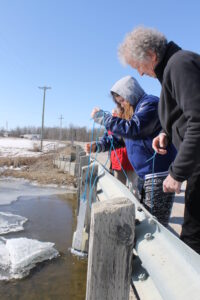
A new paper has been released demonstrating the important role community-based monitoring (CBM) can play in filling the significant water data gaps we have in Canada. The paper, co-written by a collaboration of four nonprofit organizations, one foundation, and one government agency and supported by the Our Living Waters Network, focuses on the potential of CBM to fill in these gaps which are preventing us from fully understanding the health of our freshwater ecosystems and anticipating emerging issues.
Knowing there are some concerns from professional scientists and decision makers over the quality of citizen science data, the authors clearly identify five core challenges at the heart of these concerns and then provide five case studies, one for each challenge, illustrating ways these challenges have been overcome.
“All of the co-authors bring a wealth of experience working on citizen science initiatives” says Alexis Kanu, ED of the Lake Winnipeg Foundation, and one of the authors. “We know there are tangible solutions to the challenges of CBM, but these have never been explored in a national conversation, until now.”
Kat Hartwig, ED of Living Lakes Canada and another author agrees, “Our hope is that lessons from these five case studies will resonate with CBM groups across the country, and serve as motivation to overcome these challenges so that we can fully capitalize on the opportunities presented by citizen science.”
To download and read the paper, click here, and please share it widely with your network!
About the authors:
The paper was created from the collective efforts of the following members of the Pooling Water Knowledge working group, part of the Our Living Waters Network:
Alexis Kanu, Executive Director, Lake Winnipeg Foundation
Carolyn DuBois, Program Manager, The Gordon Foundation
Elizabeth Hendriks, Vice President of Freshwater, WWF-Canada
Kate Cave, Project Manager, Centre for Indigenous Environmental Resources
Kat Hartwig, Executive Director, Living Lakes Canada
Jennifer Fresque-Baxter, Watershed Management Advisor, Water Resources Division, Department of Environment and Natural Resources, Government of the Northwest Territories
The paper was edited by Andrew Stegemann & Tim Morris, both members of the Our Living Waters Management Team.